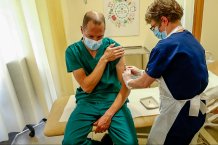Articles

GP Sam Hilton signs up to BRACE
BCG vaccine trial extends across Devon, in partnership with RD&E
A large global trial designed to test the theory that the widely used BCG vaccine might help protect against COVID-19 amongst healthcare staff and care home workers in the UK continues to recruit participants.
The Exeter study site started recruitment in October and is ongoing in the UK and globally. Now, the University of Exeter has partnered with the Royal Devon & Exeter NHS Trust (RD&E) to recruit staff, and has opened new clinics in Teignmouth and North Devon
Researchers in the trial said that as well as finding out if the BCG vaccine reduced COVID-19 disease severity, they would also be testing whether it could boost the effect of specific COVID-19 vaccines by training the body’s immune system.
The University of Exeter is leading the UK arm of the trial, called the ‘BCG vaccination to reduce the impact of COVID-19 in healthcare workers’ (BRACE) Trial.
Professor John Campbell, of the University of Exeter Medical School, is the UK lead on the BRACE study. He said: “Given recent news regarding the emergence of new strains of the COVD-19 virus, the BRACE trial remains even more relevant than ever. COVID-19 has killed more than 1.5 million people globally, with well over 75 million people acquiring the disease, sometimes in its severest forms. BCG has been shown to boost immunity in a generalised way, which may offer some protection against COVID-19. We’re excited to be contributing to the large-scale, international BRACE study where we are seeking to establish whether the BCG vaccine could help protect people who are at risk of COVID-19. If it does, we could save lives by administering or topping up this readily available and cost-effective vaccination.”
Dr Michael Gibbons, who is leading the trial at the RD&E, said: “We know that healthcare workers are at increased risk of contracting COVID-19, and while the arrival of vaccines has of course come as a huge relief, with the BRACE trial we are seeking to add to the armoury we have against the virus. This research could prove hugely valuable in protecting health workers and our patients against COVID in the future.”
The BRACE trial is coordinated by the Murdoch Children’s Research Institute (MCRI) in Melbourne, Australia. The trial has received more than $10M from the Bill and Melinda Gates Foundation and AUD1.5M from the Minderoo Foundation to allow its global expansion. The Peter Sowerby Foundation has contributed funding to support the Exeter trial site.
The UK is working with centres in Australia, the Netherlands, Spain, and Brazil in the largest trial of its kind. Globally, the trial will recruit more than 10,000 healthcare staff. Participants will be given either the BCG vaccine (currently given to more than 100 million babies worldwide each year to protect against tuberculosis (TB)) or a placebo injection. In the UK, routine BCG vaccination was stopped in 2005 because of low rates of TB in the general population.
Previous studies suggest that the Bacillus Calmette-Guerin (BCG) vaccine could reduce susceptibility to a range of infections caused by viruses including those similar to the novel coronavirus causing COVID-19. Examining the mechanism by which this may work is part of the trial being conducted by BRACE researchers. The BCG vaccine boosts immunity by ‘training’ the immune system to respond to other subsequent infections with greater intensity.
Researchers hope this improved ‘innate immunity’ will buy crucial time at this crucial phase of national deterioration in COVID-19 and increased pressure on the NHS.
Professor Campbell added: “The BRACE trial provides us with a great opportunity to offer potential help to healthcare and care-home workers in the UK. I’d really encourage care-home staff and other healthcare workers to join us, to help us find out if the BCG vaccine might provide a safe, widely available and cost-effective way to reduce the risk of COVID-19. The BCG vaccine may offer a general boost to the immune system and so may have the potential to act against new, emerging strains of the COVID-19 virus. People receiving BCG remain eligible to receive COVID-19-specific vaccines as they become available. People who have already had BCG in the past are also eligible to join the BRACE trial.”
The BRACE trial is conducted by the Exeter Clinical Trials Unit and supported by the local National Institute for Health Research funded Clinical Research Network. The trial is recruiting a wide range care and healthcare workers in the South West of England and will shortly start recruit around Keele in Staffordshire. The trial is targeting these professionals because they work in fields with high exposure to COVID-19. The trial is specifically looking at whether the BCG vaccine reduces coronavirus infection or COVID-19 symptom severity.
Professor Nigel Curtis, global lead of the BRACE trial at MCRI, said: “We are delighted that the UK is contributing to this international trial to help determine if we can repurpose an existing safe vaccine to reduce the impact of COVID-19 in healthcare workers, including those working in care homes who are at particular risk.”
Participants are asked to complete a daily symptom diary via an app, be tested for COVID-19 whenever they have symptoms, complete regular questionnaires and provide blood samples. These samples will allow scientists to understand how blood cells respond differently to exposure to COVID-19 and other viruses, with and without the BCG vaccine.
If you’re a healthcare worker you can sign up online and book an appointment at a time that suits you at any of the locations in Teignmouth, Exeter or Barnstaple. Visit the BRACE website at https://www.exeter.ac.uk/brace
Date: 8 January 2021
